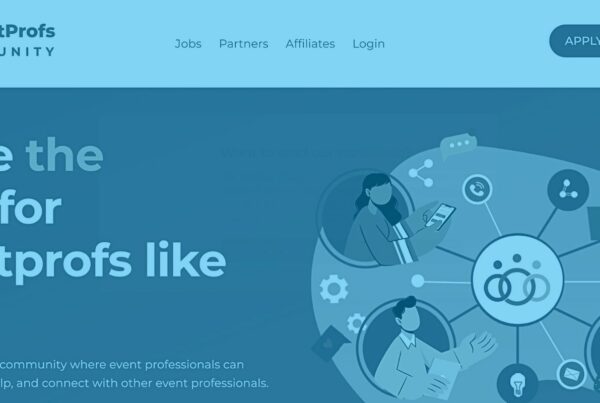According to Forbes, in-person events increased by 255% from the 4th quarter of 2021 to the second quarter of 2022. Still, as we move into 2023, more and more companies announce layoffs, spending freezes, and low metrics. And these are just a few of several trends in events to keep your eye on. In this episode of the Event Tech podcast, Will and Brandt discuss current event industry trends and the future of events. They’ll also share two helpful tips for navigating the choppy waters ahead.
Trend #1: A Return to In-Person
Brandt begins today’s conversation by sharing his observations of the events industry as it is today, “It’s a weird time in the industry right now. As much as I’d like to say we’re reincorporating the in-person audience, there’s definitely a rush to just do in-person,” he says. “A lot of online stuff is going to the wayside. It’s as if people are saying, ‘Hybrid is hard, so I’m not even going to try. Maybe it’s just the vibe for 2022; it feels like we’re in a bit of an inhale moment. So where do we go from here?”
Will can back Brandt’s observations up with data. “We collect info from everyone who downloads our content through our site. We ask what type of event you’re planning next: virtual, in-person, or hybrid. And I’ve been creating a pie chart report for the percentages of people planning different types of events,” explains Will. “Virtual has been getting smaller and smaller.”
Will thinks the future of pure virtual events is regressing to simple webinars. “It’s easy. Everyone knows what a webinar is. I thought I was going to see hybrid slowly growing. Instead, I see hybrid stagnated, and in-person events are what’s growing. That means people are planning events with no regard for the virtual audience. It feels like we’re letting go of everything we just worked on for the last 2 years.”
Trend #2: Looming Cuts in the Future of the Events Industry
We’ve previously talked about layoffs, economic downturns, and recessions. As we near the end of 2022 and approach 2023, it’s impossible to ignore more cuts in spending and increased downsizing. Will and Brandt see these post-pandemic and pre-recession changes as a sign of difficult times ahead.
“I also feel like there’s this other looming trend in events,” says Will. “When it came time to rush to virtual events, people were like, ‘I was going to do this in person, I have millions to spend, I have to spend it.’ Then they realize attendance is down after returning to in-person this year, and engagement feels much lower. I’m starting to fear that if you combine that with the potential economic downturn, come Q4, many companies won’t do events. I think pure virtual events were a solution not only for the pandemic but also for an economic recession.”
Brandt agrees. “We’re already seeing layoffs and hiring freezes. As bean counters start to look for other ways to save money, they’re going to look at the 2020 and 2021 budgets, which were significantly lower because we were doing online events. I think once we get past this initial wave of in-person enthusiasm, bean counters will say, ‘That’s great, but we had better numbers when we were doing events digitally, fully online,” he explains. “What can we do to boost that backup?’ I think planners will have to return to being fully digital or some kind of hybrid.”
“That’s an excellent point,” adds Will. “One of our biggest problems is, because the events industry is not data-driven, and most event professionals can’t look at their data and prove true ROI from their events, they will not have an argument to be able to compete with budget cuts to events. From a data perspective, the CFO will have more data to point at. I think event professionals will get strong-armed by the finance department of companies.”
Tip #1: Adopt a Year-Round Strategy and Build a Farm Team
Moving on from events industry trends, Brandt takes us to the first tip of the episode; a strategy event professionals can adopt to improve all events, lower risk, and even save money in the long term.
“One of the things I want to be careful of in this discussion is, there’s a tendency in our industry to be a zero-sum game; either we’re doing in-person, OR we’re doing hybrid, OR we’re going online,” says Brandt. “I think the best strategy is to have all these tools available. Use these tools, so you’re doing several online events throughout the year as your top-of-the-funnel. Then, a couple of months later, do another online event. A couple of months later, do a small hybrid event. That’s all driving traffic toward your giant in-person event where you make all your money.”
Will agrees with this strategy but believes people aren’t utilizing small hybrid events enough. “I think there’s so much opportunity for people to try a small event, like 50 people, and stream all the content,” he says. “Right now, people’s biggest concerns are the time it’s going to take and the budget. When you reduce the number of people and the complexity by going smaller, it allows you to experiment and fix those problems. So then, when you go towards the big event, it’s not as scary or big-budget. We have this opportunity to learn by doing while not risking your whole budget on an annual event.”
The Farm Team: Testing New Ideas in Smaller Events
Brandt finds that a multi-event strategy lets you build a farm team. The farm team is a minor league team that feeds players to a major league team as needed. As players spend time on the farm team, they develop skills they can use if they’re ever pulled to play on the main team.
“One of my clients during the pandemic locked into one of the big brand name providers for their annual event. But they then had 4 or 5 smaller online events throughout the year,” says Brandt. “They used those to test other providers. So they could say, ‘Hey, this time we’re going to try this company.’ If they found an idea they liked better in the smaller events, the big brand name could bring that to the big annual conference, and the company would already have experience. You move it up to the big leagues.”
Tip #2: Lean Into Event Anticipation
Next, Will turns our attention to year-round engagement that isn’t “community” based. “How do we communicate with our attendees when they’re not at events?” asks Will. “I think it’s a big concern moving into 2023. I’m not going to pitch the whole, ‘community is the future’ thing; I think that could be a solution, but I think there needs to be a solution if you’re not ready to build a community.”
In recent years, Will’s noticed a trend in engagement. He finds that attendees communicate through channels not directly affiliated with the event. “They have the email lists that send out official emails. They have social media channels where they post messages. But what I’m finding to be really powerful is Discord and Reddit communities that have popped up. I see a lot of value in it. What’s the equivalent for the business community? There’s so much potential for the events industry to lean on the anticipation leading up to the event, not just the event itself.”
Final Thoughts: Globalization
As Will wraps up this Event Tech episode, he has one last thing to add. “We talked about things that need to change. I think we’ll see more globalization in the future of events next year,” he says. “The amount of clients we’re seeing use translation software, captioning software, and non-English speakers as presenters at English-speaking events is huge.”
Brandt agrees. And rather than adding a trend or a tip, he adds hope. “I hope that some of the things we’ve learned over the last two years are applied to our in-person events. Whether it’s translation software, transcription software, or being able to help people who might not hear well, it’s so easy to add to our in-person events. Let’s not forget that. I hope the globalization of events continues as well.”
What event industry trends are you seeing? Do you have a prediction for the future of events? We want you to share your thoughts with us! We always read each and every single email you send, so reach out!








